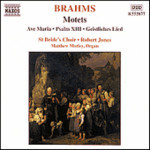
Brahms: Motets / Ave Maria / Psalm XIII
 $25.00
Low Stock
add to cart
$25.00
Low Stock
add to cart
JOHANNES BRAHMS
Brahms: Motets / Ave Maria / Psalm XIII
St Bride's Choir / Robert Jones with Matthew Morley, organ
[ Naxos / CD ]
Release Date: Friday 20 June 2008
Should this item be out of stock at the time of your order, we would expect to be able to supply it to you within 2 - 5 business days.
Brahms was to write choral music throughout his life, the earliest published work being the Ave Maria dating from 1858, a gentle work for female voices with discreet organ accompaniment.
Date of birth 7th May 1833. Johannes Brahms came into a musical family, his father, after an impoverished beginning as a street entertainer, was double bass player in the Hamburg orchestra. It was probably from his father that Johannes received his first lessons, and by the age of ten a sharp eyed American tried to sign him up as a child prodigy pianist to tour the States. Five years later he was to give his first major concert, though his interest was now towards composition. Modest success in this field came early in life, yet to earn a living he had to continue as a piano soloist and accompanist, a most productive period being with the great violinist, Joseph Joachim. It was not until he was 44 that he felt able set to work on the first of the four symphonies which were to be the corner-stone of his fame as a composer. The surprising statistic being that he wrote just 14 works for symphony orchestra. Indeed much of his compositional time was spent on a massive catalogue of solo songs and choral works.
Financially secure from his appearances as a piano soloist, he spent most of his latter years composing. He was 64 when he died in Vienna, having long before terminated all interest in his native Hamburg, where he had been thwarted in his desire to become a conductor! It is more than probable that his early death was hastened by the death of Clara Schumann, who had been his close friend during the 40 years since her husband's death.
Brahms was to write choral music throughout his life, the earliest published work being the Ave Maria dating from 1858, a gentle work for female voices with discreet organ accompaniment. The following year he wrote a quite dramatic setting of the 13th Psalm, again for female voices, though with a more important organ role. Though unmistakably from Brahms, his knowledge of Bach is quite apparent. At this stage he had not written for mixed chorus, and it is quite remarkable that after the short Geistliches Lied - which includes male voices with organ accompaniment - he launched himself into one of the great choral masterpieces, Ein deutsches Requiem. The Lied is a comfortable piece of writing, but, it has to be said, far from inspiring, which makes the Requiem all the more remarkable.
Tracks:
Fest und Gedenkspruche, Op. 109
Ave Maria, Op. 12
2 Motteten, Op. 74
2 Motteten, Op. 29
Der 13. Psalm, Op. 27
3 Motteten, Op. 110
Geistliches Lied, Op. 30